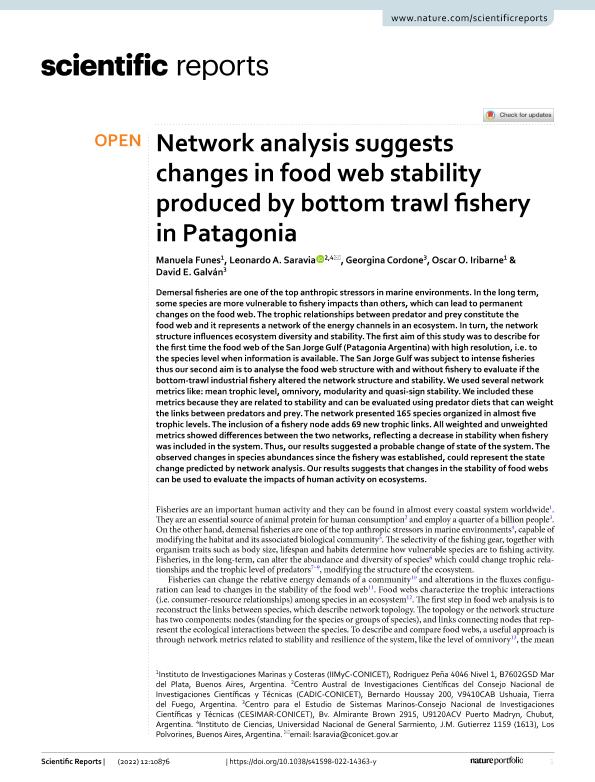Mostrar el registro sencillo del ítem
dc.contributor.author
Funes, Manuela

dc.contributor.author
Saravia, Leonardo Ariel

dc.contributor.author
Cordone, Georgina Florencia

dc.contributor.author
Iribarne, Oscar Osvaldo

dc.contributor.author
Galvan, David Edgardo

dc.date.available
2023-07-11T14:57:26Z
dc.date.issued
2022-12
dc.identifier.citation
Funes, Manuela; Saravia, Leonardo Ariel; Cordone, Georgina Florencia; Iribarne, Oscar Osvaldo; Galvan, David Edgardo; Network analysis suggests changes in food web stability produced by bottom trawl fishery in Patagonia; Nature Publishing Group; Scientific Reports; 12; 1; 12-2022; 1-10; 10876
dc.identifier.issn
2045-2322
dc.identifier.uri
http://hdl.handle.net/11336/203262
dc.description.abstract
Demersal fisheries are one of the top anthropic stressors in marine environments. In the long term, some species are more vulnerable to fishery impacts than others, which can lead to permanent changes on the food web. The trophic relationships between predator and prey constitute the food web and it represents a network of the energy channels in an ecosystem. In turn, the network structure influences ecosystem diversity and stability. The first aim of this study was to describe for the first time the food web of the San Jorge Gulf (Patagonia Argentina) with high resolution, i.e. to the species level when information is available. The San Jorge Gulf was subject to intense fisheries thus our second aim is to analyse the food web structure with and without fishery to evaluate if the bottom-trawl industrial fishery altered the network structure and stability. We used several network metrics like: mean trophic level, omnivory, modularity and quasi-sign stability. We included these metrics because they are related to stability and can be evaluated using predator diets that can weight the links between predators and prey. The network presented 165 species organized in almost five trophic levels. The inclusion of a fishery node adds 69 new trophic links. All weighted and unweighted metrics showed differences between the two networks, reflecting a decrease in stability when fishery was included in the system. Thus, our results suggested a probable change of state of the system. The observed changes in species abundances since the fishery was established, could represent the state change predicted by network analysis. Our results suggests that changes in the stability of food webs can be used to evaluate the impacts of human activity on ecosystems.
dc.format
application/pdf
dc.language.iso
eng
dc.publisher
Nature Publishing Group

dc.rights
info:eu-repo/semantics/openAccess
dc.rights.uri
https://creativecommons.org/licenses/by/2.5/ar/
dc.subject
Demersal fisheries
dc.subject
food webs
dc.subject
weighted network metrics
dc.subject
stability
dc.subject.classification
Ecología

dc.subject.classification
Ciencias Biológicas

dc.subject.classification
CIENCIAS NATURALES Y EXACTAS

dc.title
Network analysis suggests changes in food web stability produced by bottom trawl fishery in Patagonia
dc.type
info:eu-repo/semantics/article
dc.type
info:ar-repo/semantics/artículo
dc.type
info:eu-repo/semantics/publishedVersion
dc.date.updated
2023-06-30T15:18:04Z
dc.journal.volume
12
dc.journal.number
1
dc.journal.pagination
1-10; 10876
dc.journal.pais
Reino Unido

dc.journal.ciudad
Londres
dc.description.fil
Fil: Funes, Manuela. Consejo Nacional de Investigaciones Científicas y Técnicas. Centro Científico Tecnológico Conicet - Mar del Plata. Instituto de Investigaciones Marinas y Costeras. Universidad Nacional de Mar del Plata. Facultad de Ciencias Exactas y Naturales. Instituto de Investigaciones Marinas y Costeras; Argentina
dc.description.fil
Fil: Saravia, Leonardo Ariel. Consejo Nacional de Investigaciones Científicas y Técnicas; Argentina. Universidad Nacional de General Sarmiento; Argentina
dc.description.fil
Fil: Cordone, Georgina Florencia. Consejo Nacional de Investigaciones Científicas y Técnicas. Centro Científico Tecnológico Conicet - Centro Nacional Patagónico. Centro para el Estudio de Sistemas Marinos; Argentina
dc.description.fil
Fil: Iribarne, Oscar Osvaldo. Consejo Nacional de Investigaciones Científicas y Técnicas. Centro Científico Tecnológico Conicet - Mar del Plata. Instituto de Investigaciones Marinas y Costeras. Universidad Nacional de Mar del Plata. Facultad de Ciencias Exactas y Naturales. Instituto de Investigaciones Marinas y Costeras; Argentina
dc.description.fil
Fil: Galvan, David Edgardo. Consejo Nacional de Investigaciones Científicas y Técnicas. Centro Científico Tecnológico Conicet - Centro Nacional Patagónico. Centro para el Estudio de Sistemas Marinos; Argentina
dc.journal.title
Scientific Reports
dc.relation.alternativeid
info:eu-repo/semantics/altIdentifier/doi/http://dx.doi.org/10.1038/s41598-022-14363-y
dc.relation.alternativeid
info:eu-repo/semantics/altIdentifier/url/https://www.nature.com/articles/s41598-022-14363-y
Archivos asociados
